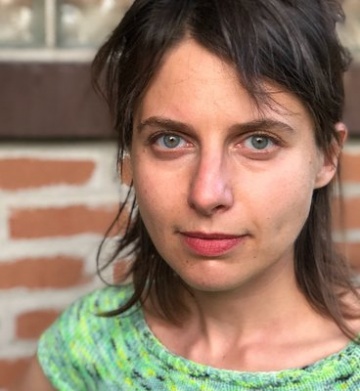Columbia College | Columbia University in the City of New York
Take Five with Demetra Kasimis ’01

What were you like when you arrived at Columbia?
I was giddy but grounded. I distinctly felt like I was falling in love. The world was peeling open. Colors seemed more vibrant. Anything was possible because I knew I was in the right place at the right time. That made the immediate future seem like a source of comfort and exhilaration. I have had very few experiences like that since then. I remember acutely missing my parents and brother, which might sound funny because they were right downtown. The fact that there were so many other students from Horace Mann on campus — something like 17 that year — gave me a curious sense of continuity with the past but not so much that it didn’t feel new. When I was 8, I lost a ring outside of Low Library. I went back to see if it was there.
What do you remember about your first-year living situation?
I knew I didn’t want a roommate and was lucky to get a single on John Jay 9. Every floor of John Jay had a “lounge,” with a television, that people rarely sat in. I wandered in one night during Orientation, just after Princess Diana died, in late August 1997. The lounge was empty except for one person from my floor, Jonathan Ferrantelli ’01, who was watching the footage from her death. We sat in silence for a bit, his eyes bloodshot and mine watery. At some point one of us gingerly approached the other over the topic at hand but soon became consumed by laughter. His red eyes were from extremely dry contact lenses and my tears were from a fight I’d had with my mom on the phone. I guess Princess Diana had nothing and everything to do with it. We are still very close friends.
What class do you most remember and why?
I was a philosophy major but took lots of seminars in Modern Greek. My independent study with Marina Kotzamani had a huge effect on me intellectually and personally. One semester junior year I had weekly meetings with her in her apartment. Over milk thistle tea and a small dish of figs and nuts, we — or I — spoke for hours about post-war Greek drama. It was intense on so many levels: The austere, minimalist language of the plays, the pressure to analyze symbolism eloquently or even just coherently (!) in Greek for long stretches of time and the way of life she exemplified. Professor Kotzamani was in her 30s, had grown up in an Athenian world of artists and journalists, was extraordinarily professional and down to earth, had an ironic sense of humor and occasionally let out an infectious laugh. It was just fun interpreting things with her. Her example probably had an indirect influence on my decision not to become a journalist and to go into academia instead. I remember that she had Roy Lichtenstein’s Drowning Girl hanging over her desk at home. One of the first things I did when I got to the University of Chicago was hang that poster in my office. Every time I look up and read, “I’d rather sink than call Brad for help,” I smile and think of her.
Did you have a favorite spot on campus, and what did you like about it?
Yes, though not technically on campus — the Spectator offices. In 1999, I was 19 and became the managing editor, which was a huge and overwhelming job for someone in her sophomore year. The first six months, before the paper went digital and our computers crashed 100 times a night because we had to make something called a “PDF,” we were still handing a hard copy of the newspaper to a messenger to take to the printer. That was wonderful. I still remember the feelings of exhaustion, satisfaction and electricity when in the early morning hours, I, the editor-in-chief, and maybe the photo editor would stand around the boards with X-Acto knives and wax trying to cover over a mistake with a last-minute ad to “Join Spec!”
What, if anything, about your College experience would you do over?
I wish I had stuck with Italian longer and majored in comparative literature in the end, given my fluency in Greek. I should have taken classes with Edward Said and Gayatri Spivak. But the truth is that I don’t have many regrets from college. I made great friends. I got to stay in the city I grew up in and adored. I had jobs at the UN and the Met. And I suppose I figured out something important about myself: I needed never to leave college!
More “Take Five”
- 1 of 32
- ›

